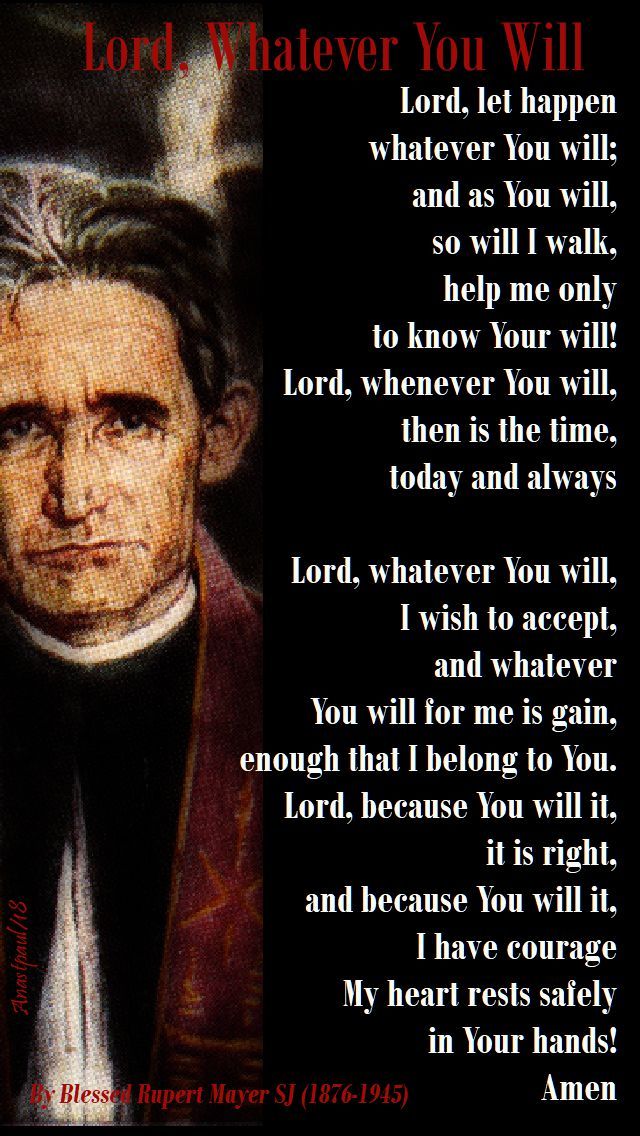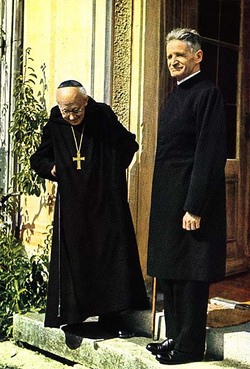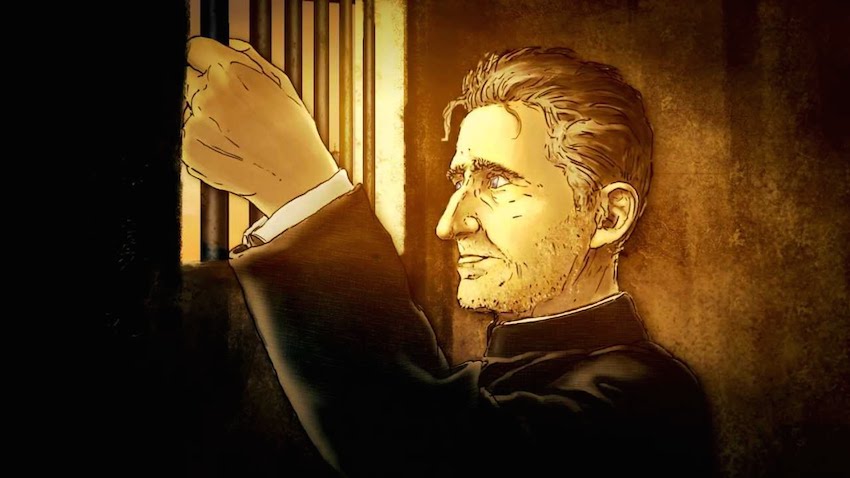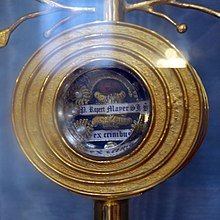Blessed Rupert Mayer, SJ
Born : January 23, 1876
Died : November 1, 1945
Beatified : November 3, 1987
 Rupert Mayer was born in Stuttgart, Germany. When he was eighteen and had completed his secondary education, he told his father of his desire to become a Jesuit but was advised that he should get himself ordained as a priest first and to enter the Society later if he was still keen to do so. Rupert accepted his father’s advice and pursued university studies in philosophy initially at Fribourg, Switzerland and Munich and then theology at Tubingen for 3 years before going to the seminary at Rottenburg for his final year. He was ordained on May 2, 1899 and celebrated his first Mass on May 4.
Rupert Mayer was born in Stuttgart, Germany. When he was eighteen and had completed his secondary education, he told his father of his desire to become a Jesuit but was advised that he should get himself ordained as a priest first and to enter the Society later if he was still keen to do so. Rupert accepted his father’s advice and pursued university studies in philosophy initially at Fribourg, Switzerland and Munich and then theology at Tubingen for 3 years before going to the seminary at Rottenburg for his final year. He was ordained on May 2, 1899 and celebrated his first Mass on May 4.
He served for a year as an assistant pastor in Spaichingen and then entered the Jesuit novitiate at Feldkirch in Austria on Oct 1, 1900. After his noviceship he went for further studies in the Netherlands and between 1906 to 1911, he traveled through Germany, Switzerland and the Netherlands, preaching missions in many parishes. Fr Mayer’s characteristic apostolate began when he was transferred to Munich in 1912 where he devoted the rest of his thirty-one years to the migrant people who came from farms and small towns seeking employment and a place to stay .
Fr Mayer responded to the needs of the migrants; he collected food and clothing and searched for jobs and housing for them, and helped them preserved their faith as the city was becoming “pagan.” When Germany entered into World War I, Fr Mayer volunteered his services initially at a camp hospital, but later made Field Captain and traveled with his men to France, Poland and Romania where he was in the front line of battle. His courage became a legend among his soldiers; he was with them in their trenches, and stayed with those dying until the end. His courage was infectious and his presence gave the men hope. In Dec 1915 he was awarded the Iron Cross for bravery, a rare honour for a chaplain but his army career came to a swift end in 1916 when his badly shattered left leg had to be amputated.
 After his convalescence, Fr Mayer went back to Munich and did all he could to help its citizens to recover from the war’s aftermath. He was appointed director of the men’s sodality and within nine years the membership grew to 7000 with men coming from fifty-three different parishes which meant the indefatigable Fr Mayer had to sometime give seventy talks a month to speak to each group. For the convenience of travelers, Fr Mayer introduced Sunday Masses in 1925 at the main railroad terminal and he himself celebrated the first two, beginning at 3:10am. Fr Mayer’s apostolate extended to the entire city and if Munich were a single parish, then the pastor would have been Fr Mayer!
After his convalescence, Fr Mayer went back to Munich and did all he could to help its citizens to recover from the war’s aftermath. He was appointed director of the men’s sodality and within nine years the membership grew to 7000 with men coming from fifty-three different parishes which meant the indefatigable Fr Mayer had to sometime give seventy talks a month to speak to each group. For the convenience of travelers, Fr Mayer introduced Sunday Masses in 1925 at the main railroad terminal and he himself celebrated the first two, beginning at 3:10am. Fr Mayer’s apostolate extended to the entire city and if Munich were a single parish, then the pastor would have been Fr Mayer!
Postwar Munich saw the rise of communist and social movements. Fr Mayer kept a close watch on them, attending their meetings and even shared the platform with their speakers, not to praise them but to raise Catholic principles to point out falsehoods and to indicate the evils to which these speakers were leading their audiences. Fr Mayer also witnessed the rise of Adolf Hitler and also boldly spoke out against the falsehoods Hitler was propagating by stressing Catholic principles. Fr Mayer could not be a National Socialist and it was inevitable that conflict would arise between him and the Nazi movement as the religious response to evil.
In 1933 when Hitler became chancellor of the German Reich, he showed his true colours and began to close church-affiliated schools and started a campaign to defame the religious orders in Germany. Fr Mayer spoke out against this persecution from the pulpit of St Michael’s in downtown Munich and because he was a powerful influence in the city, the Nazis could not tolerate such a force to oppose them. On May 16, 1937, the Gestapo ordered Fr Mayer to stop speaking in public which he obeyed but he continued to preach in church. Within two weeks, he was arrested and was imprisoned for six weeks before his trial where he was given a suspended sentence. He obeyed his superiors’ orders to remain silent but the Nazis took advantage of his silence to defame him in public. To exonerate himself, his superiors allowed him to return to the pulpit to defend himself against the Nazis’defamatory attacks. He was arrested six months later and served his suspended sentence in Landsberg prison for five months until a general amnesty freed him to return to Munich and work in small discussion groups

As the Nazis were still fearful of him, they arrested him again in Nov 1930 under the pretext that he had cooperated with a royalist movement. Fr Mayer was sixty-three and was sent to the Oranienburg –Sachsenhausen concentration camp near Berlin. After seven months his health deteriorated so badly that camp officials feared he would die and as they did not want to turn the popular priest into a martyr, they sent him in solitary confinement in the Benedictine abbey in Ettal in the Bavarian Alps. Fr Mayer spent his confinement in prayer, waiting for the disposition of Divine Providence. He remained in the abbey for almost 6 years until American soldiers freed him in May 1945.
Fr Mayer returned to Munich on May 11, 1945 and immediately resumed his apostolic work at St Michael. The years in prison and solitary confinement took a tool on his health. On Nov 1, 1945 Fr Mayer was celebrating the 8.00 am Mass on the feast of All Saints in St Michael’s and after reading the Gospel began his sermon. His topic was the saints in heaven and the Christian’s duty to imitate them to gain Paradise. In the middle of his sermon, while his thoughts were on heaven, his heart stopped, and the sixty-nine old Fr Mayer collapsed and died shortly afterwards. He was buried in the Jesuit cemetery at Pullach, outside Munich but his remains were brought back to the city and interred in the crypt of the Burgersaal, the church next to St Michael’s, where the men’s sodality regularly met.
 Fr Mayer the preacher in Munich and the staunch opponent of Hitler was beatified by Pope John Paul II in Munich on Nov 3, 1987.
Fr Mayer the preacher in Munich and the staunch opponent of Hitler was beatified by Pope John Paul II in Munich on Nov 3, 1987.
